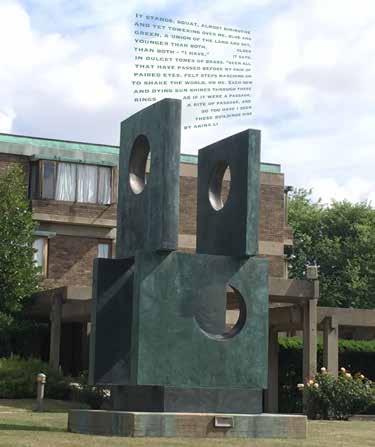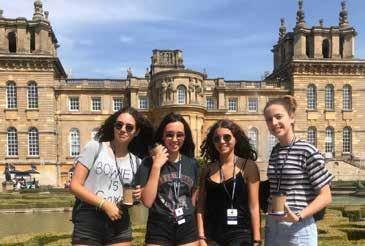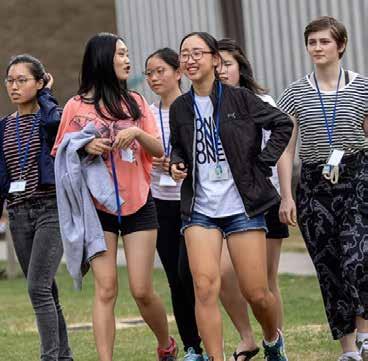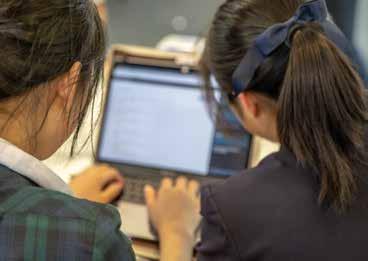
12 minute read
School’s in for summer – University summer programs
GLOBAL PERSPECTIVES
School’s in for summer – University of Cambridge and University of Oxford summer programs
By Geography teacher, Mr Gabriel Langford
In Term 3 2018, Pymble nominated ten students to represent the College at the Cambridge Programmes and the Oxford Royale Academy in England. The summer programs, which are run by top universities including the University of Cambridge and the University of Oxford, aim to open young minds to leading global educational practices in fields that students elect as their potential future passions. The universities offer courses including Law, English Literature, Advanced Mathematics, Medicine, among others, as well as a raft of elective courses designed to capture the minds of the next generation of researchers and business leaders. Below are some reflections from our girls that illustrate how the programs extended their thinking and challenged their intellect in incredibly poignant ways.
THE CAMBRIDGE PROGRAMMES
Pymble students, Akina Li, Viveca Tang, Rachel Tang, Amelie Reed, Shivashankari Kathirgamalingam, and Corinna Chen, visited Churchill College at the University of Cambridge. Our girls exemplified the College value of Integrity by putting themselves in challenging situations to further their understanding Students of their fields of passion. reported During the first week of that their studies the program, Shivashankari suddenly became represented Pymble in the valuable and they Law course and earned high reported increased praise from the program metacognition in directors and mentors by viewing the bigger winning a mock legal trial purpose behind (moot) of a case in England education.” that had previously drawn ire in the public realm. “We competed in a moot at the end of the first week, which I thoroughly enjoyed and am eager to try again at school during the next few years. As someone who enjoys debating, mooting was a really great opportunity to challenge myself to apply the oratory skills I have thus far developed to an advocacy setting… and (we) were challenged to utilise proper legal reasoning.” Shivashankari Kathirgamalingam
Shivashankari Kathirgamalingam, left, debating the merits of legal protection for people who act outside the law
Rachel, Viveca and Amelie participated in the Medicine program where they were exposed to the fascinating research fields within the industry, as well as applied Medicine in the operating theatre. Our girls offered insightful reflections about the value of being exposed to world-leading research practice, and learning alongside people of diverse backgrounds: “During the course of the fortnight-long Cambridge summer program, I found that I gained some overwhelmingly valuable medical insights, in addition to having built genuinely unforgettable connections with students from all over the world. This can be largely attributed to the cohort of dedicated, enthusiastic and insightful lecturers and mentors I engaged with. I would like to make special mention of Dr. Kourosh Saeb-Parsy, consultant transplant surgeon at Addenbrooke’s Hospital, who was the Medicine program’s main lecturer. His wisdom, guidance and leadership were instrumental in allowing me to formulate my decision to pursue a career in Medicine. The teaching style he employed, which consisted of effective collaboration and meaningful group discussions, made the learning experience highly enjoyable. Furthermore, interacting with students from geographically distinct backgrounds lent itself to a diverse, enriching and educationally fulfilling exchange of knowledge and conventions.” Viveca Tang
‘Phoem’ created by Akina Li, Year 11

“It was amazing to be able to interact with students from countries all over the world and exchange knowledge and culture. The highlight of the experience for me was when we were in the operating theatre. We learnt about anaesthesia, sterilisation and the general equipment used when performing surgeries.” Amelie Read Akina challenged herself in the English Literature program. The students were asked to produce a creative expression in a modality of their choice. Akina chose the ‘phoem’ method, where a poem is superimposed over a photo (pictured, above) to illustrate the student’s thinking.
THE OXFORD ROYALE ACADEMY
Alannah Webster, Teresa Su, Carina Ma and Tiffany Tang pioneered the Pymble journey to the Oxford Royale Academy at the University of Oxford. As the first group of students from Pymble to attend the course, our girls earned accolades from their mentors and were phenomenal representatives for the College. While on another program to Cambridge, our girls stayed in separate colleges and participated in a variety of activities well outside their comfort zones. In this, they exemplified the College value of Courage, forging new friendships and showing themselves to be resilient to challenges when meeting new people and learning new content. Alannah stayed at St Peter’s College, and reflected on the different teaching styles she witnessed, which align with university praxis: “Something that was extremely different to Pymble Ladies’ College, was at the end of most lessons we had to make a short group presentation to our class of about 15 students about the different aspects of the topic we learnt that day. This helped me gain so much confidence as the short time frame did not allow for excessive preparation. It also forced me to be adaptable because I had to change what I was saying depending on what my group members said. From this experience, I realised that there is more than one path that you can take - both to an answer and throughout life.” Alannah Webster Carina and Teresa stayed at St Catherine’s College in Oxford and participated in the medicine branch of the Academy. Their reflections speak of the program’s value in succinct and astute ways: “The approach to learning has certainly been unique and engaging, and allowed me to learn each subject in great depth. This included class discussions, presentations, laboratory activities and clear explanations of concepts from knowledgeable teachers. This academic experience has complemented my learning at Pymble. In learning at Oxford, I have felt myself being positively challenged by the coursework and assignments, which gave me the opportunity to gain a better understanding of science on both a personal and global perspective.” Carina Ma “I was overwhelmed by the diversity of students who attended the course. They were from many different nations in Europe, Asia, South America and the Middle East. It was amazing to hear about what the high school experience is like across the globe. Seeing the power of knowledge in connecting people across race, gender and social background was the highlight of my trip.” Teresa Su
Pymble students exploring the University of Oxford

GLOBAL PERSPECTIVES
THE VALUE OF THE EXPERIENCE
The programs challenged our students in ways that opened their eyes to the unlimited pathways of the future for a Pymble girl. Simply asking how their day was on the programs leant itself to a phenomenal conversation that sparked passion and interest in ways that cannot be quantified with words. Our students have genuinely engaged with the global academic community and have demonstrated that they are more than ready to pen the next literary masterpiece, or begin researching a field that may revolutionise the understanding of Medicine.
INQUIRING FURTHER
Following my experience with students in the 2018 Cambridge and Oxford summer programs, I was inspired to conduct research into these programs from the perspective of student feedback one to three years after their visit. The focus of this research is to ascertain the impact that these particular learning opportunities have had on the Year 10 students who attended. The students chosen by the College to visit these programs must demonstrate strong and consistent academic prowess, have good references from their teachers, demonstrate resilience and independence, and be able to show good qualities of character. They are required to submit an expression of interest and attend an interview with the Head and Deputy Heads of the Upper School in order to be a successful candidate. The research was conducted online via Microsoft Forms, exploring the impact this experience has had on them as a learner from a qualitative perspective. The aim is to determine whether or not there was a positive, negative or neutral outcome on their learning styles, as well as future aspirations, and whether the program has had a lasting impact on their studies. Of the full sample of 22 participating students, 55 per cent responded, offering anecdotal feedback about the change they experienced as individuals. The following questions were asked: 1. In a word, how would you describe your overall experience in Oxford/Cambridge? 2. What were your expectations of going on academic exchange before your arrival in Oxford/Cambridge? 3. How would you describe yourself as a learner before this exchange? 4. How would you describe your perspectives of learning once you had returned to the College? 5. What would you reflect upon as the single greatest point of impact upon you as an individual whilst on exchange? 6. Has there been an impact or change on your future choices of study/work beyond schooling in Australia? 7. If yes, how has it shaped your expectations and intrinsic desires to study? Following, is an interpretation of this qualitative data against a framework of the College’s hopes for those who had the opportunity to participate. It was expected that students would respond with reference to the cultural differences they experienced amongst a group of like-minded students from across the globe, the challenge of academics at a leading global standard, and the aspirational growth of the individual.
Summary of Findings
Students reported that their studies became valuable and they reported increased metacognition in viewing the bigger purpose behind education.
Students began to value the processes of learning and critical thinking more highly, and saw these as beneficial beyond examination questions. Students were exposed to global thinking routines and gained confidence in their ability as learners. They recognised they were equally capable compared to the world’s best minds who also attended the programs.
BACKGROUND TO THE STUDY
In a large school of more than 2,200 students, the breadth of individuals means that the College can expect to have a large pool of extremely talented and gifted learners in its midst. Between 2016 and 2018, this has proven true for the 22 candidates who visited Oxford and Cambridge as representatives of the College. Our students have a wide range of learning abilities, some of whom will likely have far eclipsed the curriculum due to their abilities at their chronological age. It is evident that the vetting process helps us identify students who will be most suitable for this program. It is apparent we are sending some of our best learners and as such it could be expected to see in the data an evolution from students we see as enormously capable, to students who have gained greater insight into their metacognition and capacity as learners. As the teacher that accompanied students in 2018, and having taught most of them in my classroom at some point in their learning journeys, I was extremely interested to understand how the individual would reflect on her time in the program. Further, I wanted to determine if there had been an evolution of motivation; whether
there was still a highly extrinsic motivation to achieve outstanding results, or if a shift had occurred towards a more independently guided and intrinsic desire to learn amongst the best minds in the world.
Our students have genuinely engaged with the global academic community and have demonstrated that they are more than ready to pen the next literary masterpiece, or begin researching a field that may revolutionise the understanding of Medicine.”
FINDINGS
A number of key themes emerged from the data: • There was an increased motivation for already high-achieving students who now saw more purpose behind the critical thinking processes they were being taught. • The exposure to different learning styles evident amongst students from a global talent pool assisted
Pymble students to develop confidence to debate and challenge ideas, and not be content to be passive learners. • Learning as a point of pleasure and adapting to new learning methods is something that can bring satisfaction beyond extrinsic examination rewards. • Students gained an appreciation for the calibre of learning in their home setting at Pymble. Teaching methods at Pymble Ladies’ College for highpotential learners places a strong focus on choice and self-efficacy in determining solutions to problem-based issues. At the top end of the learning spectrum, the girls are well versed in thinking critically and using language to extrapolate information and make qualitative judgements about most ideas. The Oxford and Cambridge program data revealed that students did not necessarily learn how to think critically or creatively at a deeper level; rather, students reflected on the need to be considerate of different learning styles. Being largely self-directed with an emphasis on tutorial style learnings, student reflections revealed a new appreciation for learning styles across a global context. Being exposed to students their own age from extremely contrasting backgrounds in both Eastern and Western settings enabled Pymble students to value the learning style, rather than the content they were expected to master. There was a strong correlation in the data showing that students wished to attend an overseas university at some point in their future academic careers as a result of attending the program. Students largely reflected on the fact that whilst this opportunity did instil a sense of nervousness, the program demystified the process of physically studying abroad. Interestingly, some articulated that the opportunities in Australia were adequate for their future academic pursuits. It appeared that the need for a global experience could possibly be satisfied for some by a semester exchange to an overseas university. For these students, it seemed that they were happy to complete an undergraduate degree in Australia and potentially think of studying abroad for postgraduate purposes.
CONCLUDING THOUGHTS
Though there was an assumption that this research would find students highly impassioned to study overseas after life at Pymble, which was the case in most responses, it was pleasing to find that students gained confidence in their abilities to discuss great ideas with like-minded peers. Great leaps and bounds were made in student abilities to fully comprehend the logic behind why education is implemented the way that it is in Western countries such as Australia, and at schools like ours. This led to an increased intrinsic desire to learn, where grades no longer became the focus of achievement. The focus was on personal growth and capacity to understand others and disseminate ideas to their fullest extent.
Pymble students experiencing the University of Cambridge











